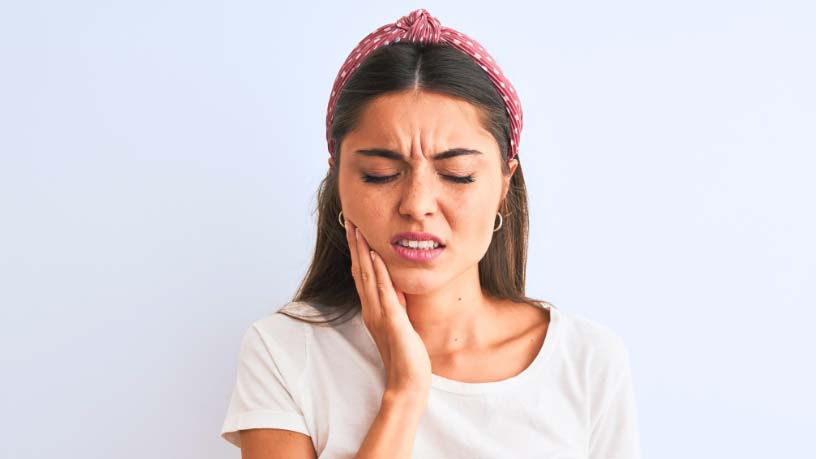Find out what temporomandibular joint (TMJ) dysfunction is.
On this page
Key takeaways
TMJ dysfunction can lead to a range of symptoms, including jaw pain and headaches.
A sore jaw can indicate other issues, such as teeth grinding.
Your jaw is probably not something you give much thought to. That is, of course, until you do.
If you have problems chewing or opening your mouth, or if you hear clicking or popping noises when you move your jaw, you may have temporomandibular joint (TMJ) dysfunction.
What is TMJ dysfunction?
Your TMJ is the joint that connects your jaw to your skull (on each side of your face). It allows you to open and close your mouth, helping you to eat, talk and express things with your face. TMJ dysfunction affects this area.
The disorder is most common among people aged between 20 and 40. Women are around 4 times more likely to experience it.1
Symptoms and causes of TMJ dysfunction
TMJ dysfunction can affect one or both joints and surrounding muscles. Symptoms can range from mild to severe and may come and go.
Common symptoms include:
- jaw pain, stiffness, clicking or popping
- facial pain
- headaches or throbbing temples
- ear symptoms, such as earache, tinnitus and ear pressure
- tooth pain
- neck and shoulder pain
- difficulty chewing
- jaw lock.
TMJ dysfunction is caused by things like bruxism, the constant clenching or grinding of your teeth (sometimes at night). Other causes include:
- dental issues, like new fillings or dentures
- injury to your teeth, head or neck
- wear and tear from osteoarthritis
- tumours in your bones or soft tissue
- psychological factors
- problems with the nerves that transmit pain.
Sometimes, the cause of TMJ dysfunction is never discovered.
Teeth grinding
Up to 90% of people grind their teeth at some point in their lives.2 However, only 5% consistently grind them with force.3
Common causes of bruxism include:
- stress and anxiety
- smoking
- caffeine consumption
- alcohol and other drug use
- certain medications
- snoring.
If you grind your teeth while sleeping, you might not realise you’re doing it. A partner may hear the sound, or you may find yourself waking up with unexplained soreness in your jaw.
As well as TMJ dysfunction, untreated teeth grinding can lead to damaged teeth, sleep disorders and facial pain.4
Treatments for TMJ dysfunction
If jaw pain is bothering you, see your GP or dentist. They will do a physical examination and may send you for an X-ray, CT or MRI scan.
In most cases, TMJ dysfunction will ease over time. But there are ways to support the process:
- pain medication. Painkillers, muscle relaxants and medications for inflammation may be helpful. Putting a warm compress on the painful area is another way to ease soreness.
- mind and body techniques. Treatments like biofeedback therapy may help you gain control over involuntary body functions.5
- psychotherapy. Treating any underlying emotional factors may be effective.
- passive stretching exercises. Gentle stretching may help with joint movement (but it might not reduce any pain).6
- teeth-grinding strategies. These include wearing a special mouthguard at night, cognitive behaviour therapy, exercise and relaxation techniques.
- lifestyle changes. This may include eating softer foods, cutting food into small pieces and avoiding things like chewing gum.
- surgery. In some cases, surgery may be required to change your jaw structure.


At Bupa, trust is everything
Our health and wellbeing information is regularly reviewed and maintained by a team of healthcare experts, to ensure its relevancy and accuracy. Everyone's health journey is unique and health outcomes vary from person to person.
This content is not a replacement for personalised and specific medical, healthcare, or other professional advice. If you have concerns about your health, see your doctor or other health professional.
1Lomas, J., Gurgenci, T., Jackson, C., & Campbell, D. (2018). Temporomandibular dysfunction. AJGP, 47(4).
2Murali, R. V., Rangarajan, P., & Mounissamy, A. (2015). Bruxism: Conceptual discussion and review. Journal of pharmacy & bioallied sciences, 7(1), S265-S270.
3Better Health Channel. (2020). Teeth grinding. Victoria State Government, Department of Health.
4Cleveland Clinic. (2023). Bruxism (Teeth Grinding). Cleveland Clinic.
5Mayo Clinic. (2023). Biofeedback. Mayo Clinic.
6Lomas, J., Gurgenci, T., Jackson, C., & Campbell, D. (2018, April). Temporomandibular dysfunction. Australian Journal of General Practice, 47(4).
You might also like...
The importance of oral hygiene
Bupa dentist Dr Malcolm Duff explains why looking after your teeth and gums should be an important part of your daily routine.
Bruxism: The teeth disorder you might be sleeping on
If you’re having trouble sleeping, your teeth might be to blame. Find out how bruxism may be affecting you.
Osteoarthritis
The most common arthritis in Australia, osteoarthritis develops over time and can result in painful joints. Find out how this condition might affect you.
7 simple ways to look after your dental health at home
You might have brushed your teeth every day of your life, but you may be getting some things wrong. Learn how to improve your dental game with expert tips.





